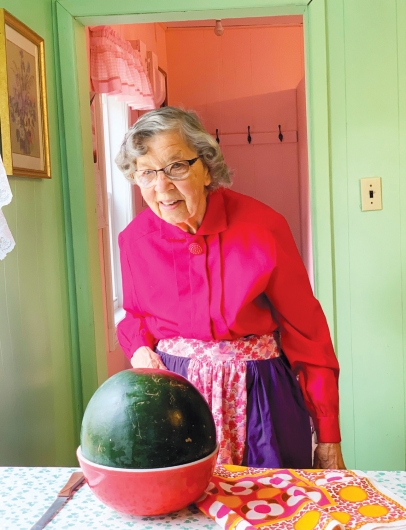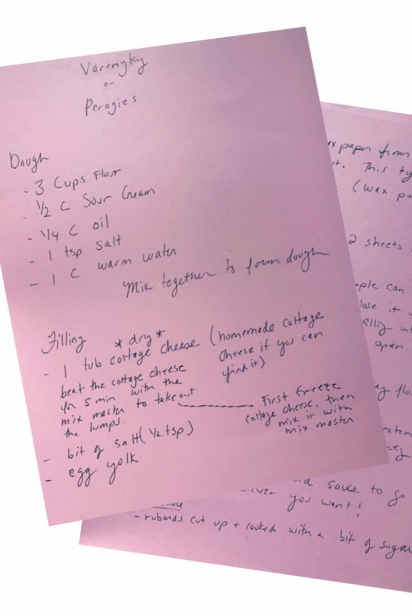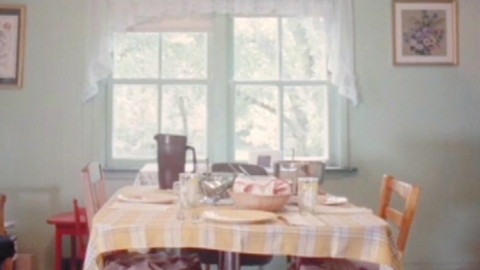Food at the Heart
Originally published in Issue No. 23, Spring 2022
Art, Love, and Life in Agatha’s Almanac
A close-up shows an aluminum pot, surely years old, bubbling on a stovetop. Weathered hands enter the frame and carefully drop small, folded dumplings into water one by one. The movement is quick, deft, and lithe. The delicate perogies make no sound as they slip into the boiling water. Someone speaks: “You always use a wooden spoon so the perogies don’t break while they are coming to a boil.” The voice is gentle, but directive—clearly this is important to the careful preparation we witness.
This is a scene from Agatha’s Almanac, an ongoing series of films by the artist Amalie Atkins documenting the lifeways of her 86-year-old aunt Agatha Bock. A selection of the films, rotating with the seasons, are on view at the Anchorage Museum through September 2022 as part of the exhibition Counter Cartographies: Living the Land. Each film captures a seasonal glimpse into Bock’s knowledge about living the land in rural Manitoba, growing, harvesting, storing, and, importantly, sharing food. Bock carries generational knowledge of plants and seed as the daughter of Mennonite immigrants from Ukraine. Rather than craft a cookbook of recipes, Atkins has sought to capture not only what Bock grows and cooks but also how and when to create a filmic almanac, a calendar or handbook which gathers important dates, information, and guidance.
Bock’s gestures, actions, and dance-like movements of caring for ingredients are poignantly precise, holding decades of wisdom and practice. Their precision and idiosyncrasy almost seem scripted. “She is, in a way, a performance artist of her own life... everything she does is a process,” says Atkins. “There is not anything in her life that does not have a specific order. The process does not always make sense to me, but it makes sense to her.”
The first film in the series on view at the Anchorage Museum captured Bock opening a watermelon. Tenderly shot, the 16 millimeter film shows her quiet and unusual removal of the rind in long strips to reveal whole, round watermelon “steaks,” which she then cuts in thick slices. We watch Bock’s hands up close as they carve the homegrown melon in the way of a sculptor. Panning away, the film situates Bock in her bright kitchen, which, despite its precise composition, is not a set constructed by Atkins, but Bock's specifically appointed home. Her unique approach to cutting the watermelon demonstrates a careful portioning of summer’s bounty: residual rind protects any uneaten watermelon for future feasting. Atkins says, “Agatha could make a watermelon last a month!” The slow, thoughtful, and care-filled actions which Atkins captures illustrate special attention and pride in sustainable, artful foodways and lifeways.
Bock's artistry of everyday life infuses the food she shares. Atkins lost her mother suddenly at a young age, and Bock served, and serves, as a role model of strength, independence, and wisdom. Now an octogenarian living alone on the homestead where she grew up, Bock is, as Atkins says, “unstoppable.” In fact, she just got running water after ten years without as she waited for her brother (in his 90s) to be able to assist in the repair. As she describes in the film in which she makes perogies, she brings water meant for boiling the special perogies in from Winnipeg. Everyday water, on the other hand, she collects in rain barrels. “When it doesn’t rain, I am really in trouble. This spring it did not rain for three weeks, so I was really in a panic. I was down to two pails of the water that I had saved, and I had to ask my neighbor to bring me some. And then we had a huge rainstorm, big enough to flood my living room because my roof is leaking.” Still, nothing seems to hinder Bock from her careful attention to growing, harvesting, and generously sharing the fruits of her labor.
Food is at the heart of Bock's life, and her connection to Atkins. Atkins says she learned from her mother and Bock that food is love, and preparing and sharing food is a means of communicating that love. Bock is known for her perogies, which she will bring in her carryon bag to ensure their safety during travel. Bock has trained visiting family members to call ten minutes out from the house so that she can boil the perogies to be ready precisely when a guest walks through the door. These soft, warm dumplings nourish more than bodies. They nourish souls and connections between loved ones.
Today, Atkins passes on that sense of appreciation for foodways as an artful practice of everyday life and loving. Her two children, ages seven and 11, share a community garden plot with her “split three ways.” Despite living in an urban setting, Atkins seeks to recreate her own childhood experience of constant access to outdoor space on her family farm. Together, Atkins and her sons grow vegetables for harvest, sometimes using family heirloom seeds. And, they have transformed a portion of their front yard into a garden. For her sons, the process is “miraculous”—Atkins did not want to deflate their excitement by telling them the potatoes and carrots were a bit small this past year. As a family, they experience the seasons, appreciate the joy of growth and harvest, and deepen family connection.
The Agatha’s Almanac project continues to grow as new films are made and Amalie compiles an artist book which will include more of Bock's special recipes and lists. Her project documents the foodways held in her family and shares that knowledge tenderly, imparted with love. The recipe shared here, directly from Bock, is a loving embrace of the richness of finding artistry in everyday life. These perogies invite one to slow down, savor the process and practice, delight in flavors, and share with those you love.







